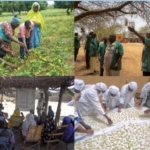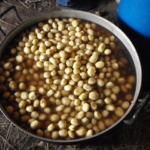


Institut National de la Recherche Agronomique du Niger (INRAN)
Burkina Faso Niger Mali
9/2019—9/2023
Pearl millet, sorghum, and legumes are staple food crops of the Sahelian region of West Africa. However, despite great potential for locally processed, derived foods, their fortification to improve the nutritional status of rural populations, and income generation and empowerment of rural women and youth, little has been done to address the development of rural markets for these crops. Child malnutrition, reflected in moderate or severe stunting of children under five years old, continues to be a major problem in the region. There is a clear need for a systems approach to realize the potential of local markets that provide rural women and young people with access to cost-effective, socially innovative, scientifically based, culturally relevant food processing and nutrition technologies. To address these challenges and opportunities, the previous phase of this project, in cooperation with the USAID-funded Sorghum and Millet Innovation Lab (SMIL), established five Food Innovation Centers and promoted several women processor associations in rural Niger and Burkina Faso. Ongoing activities in Niger and Burkina Faso show gains in processing/nutrition knowledge and sharing among women. Women’s associations have seen increasing incomes by establishing rural markets through development of value-added and nutrient-fortified cereal-legume-based foods made for local populations. The project team have developed affordable foods that people (including kids) really want to eat. Moreover, the project has shown that locally formulated and processed nutrient-fortified foods are preferred over food aid products (maize and millet/soy blends). Rural women associations have taken the initiative to train women from neighboring villages so that a transformative effect on households is starting to spread. This dissemination of knowledge now includes several villages at each of the five centers in Niger and Burkina Faso. The project has worked towards driving adoption of new crop varieties, improvement of nutrition and incomes, and to empower women and youth. The overall goal in the next phase is to continue promoting and refining this sustainable market-driven model for cost-effective and nutritionally enhanced foods for local communities in West Africa.
The purpose of this request is to build on these past successes to expand the scope and positive impacts of the food innovation centers, managing key problems and advancing opportunities. In the next phase, the team proposes to:
New centers will be implemented to strengthen the spread of processing and nutritional fortification, and rural markets to support entrepreneurship. New secondary and tertiary rural food processing groups will be established, and existing ones strengthened in Niger and Burkina Faso. A new food innovation system will be implemented in a modest way in Mali, where an incubation center was already established at IER Sotuba in 2010-12 through the USAID INTSORMIL CRSP program. The team will test the nutritional impact of nutrient-fortified products (developed to suit local preferences) through a market-led adoption study. Aflatoxin-safe foods will be ensured at both household/ farm and project/lab levels through developing ways to minimize aflatoxin in peanuts. Peanut shells will be used by women groups at food innovation centers as a fuel source for roasting ingredients for nutrient-fortified food products – a first step towards circular economy. These activities are empowering for rural women participants and aspects of empowerment will be documented.

